A statement of purpose also referred to as SOP, is a document written to the admission committee/panel by applicants as part of the application for graduate programs.
In this article, we have provided a step-by-step guide to writing it along with many professionally crafted examples. It is utilized to highlight who the applicant is and what they want to be, along with their career goals, experience, and how their qualifications make them suitable for a particular graduate program.
Details that can be included in the document are previous jobs, internships, publications, grants, presentations, and exhibitions you have in relation to the graduate program.
For example, for an accountant position application, you can use it to highlight the 15 months internship program you have taken at a local accounting firm and CPA majors you have done at the State’s renowned school of finance. Key achievements and qualifications can be reiterated throughout the document to reinforce the applicant’s suitability for the program.
Free Examples
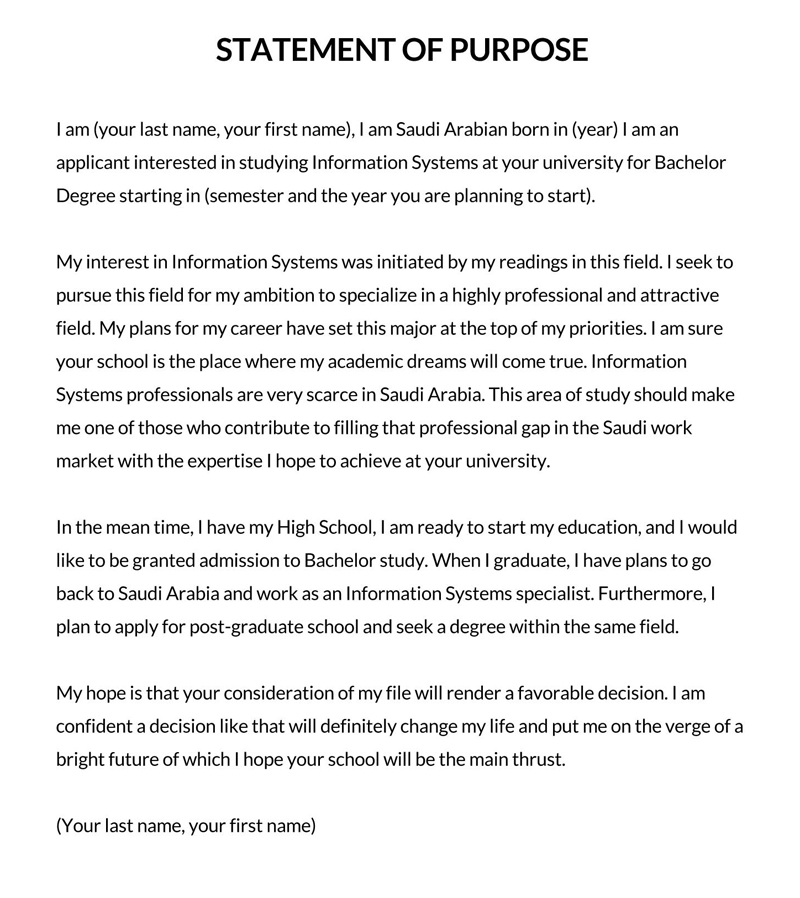
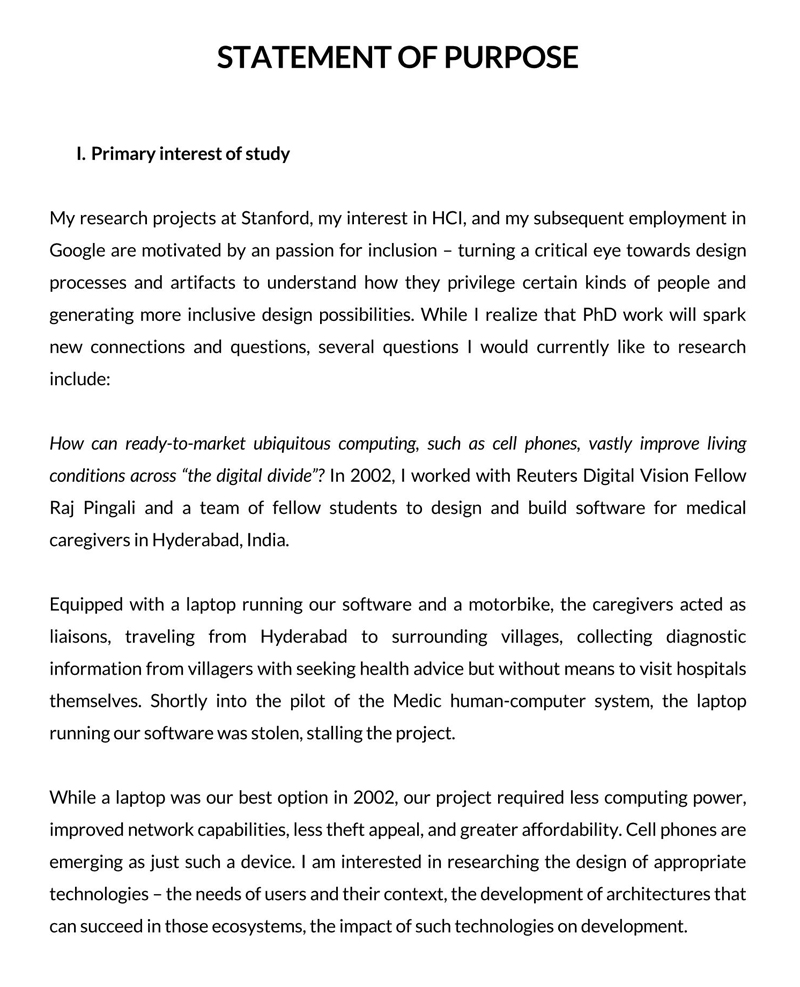
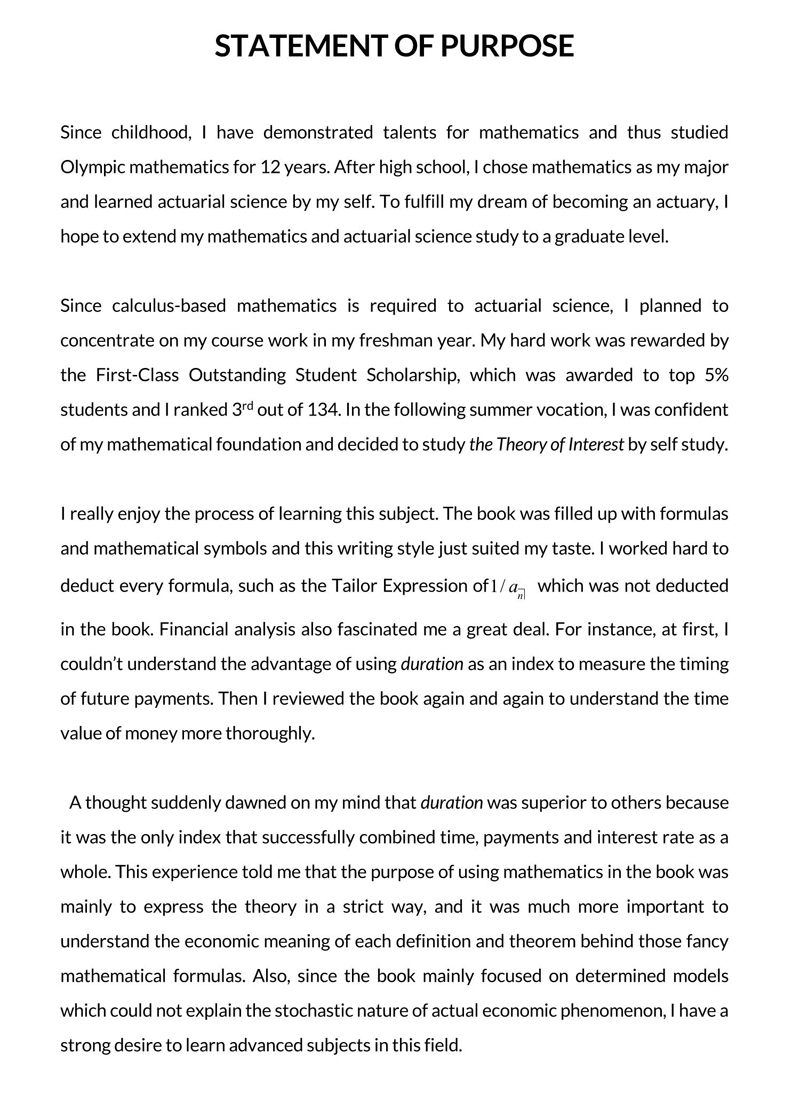
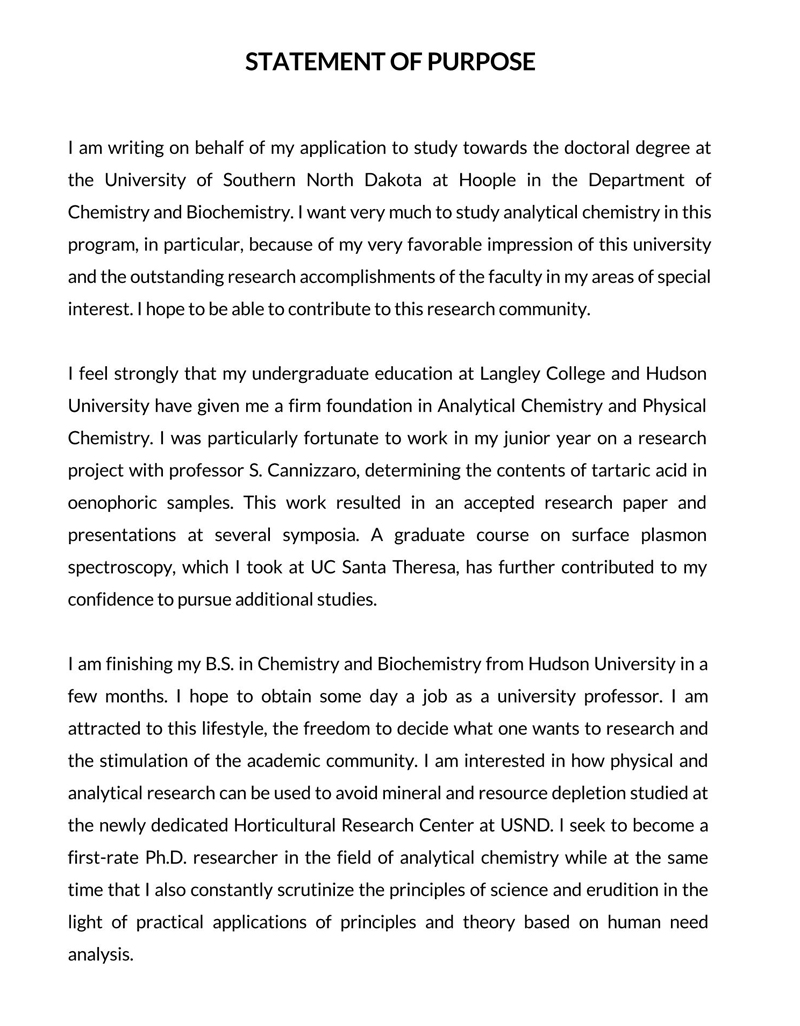
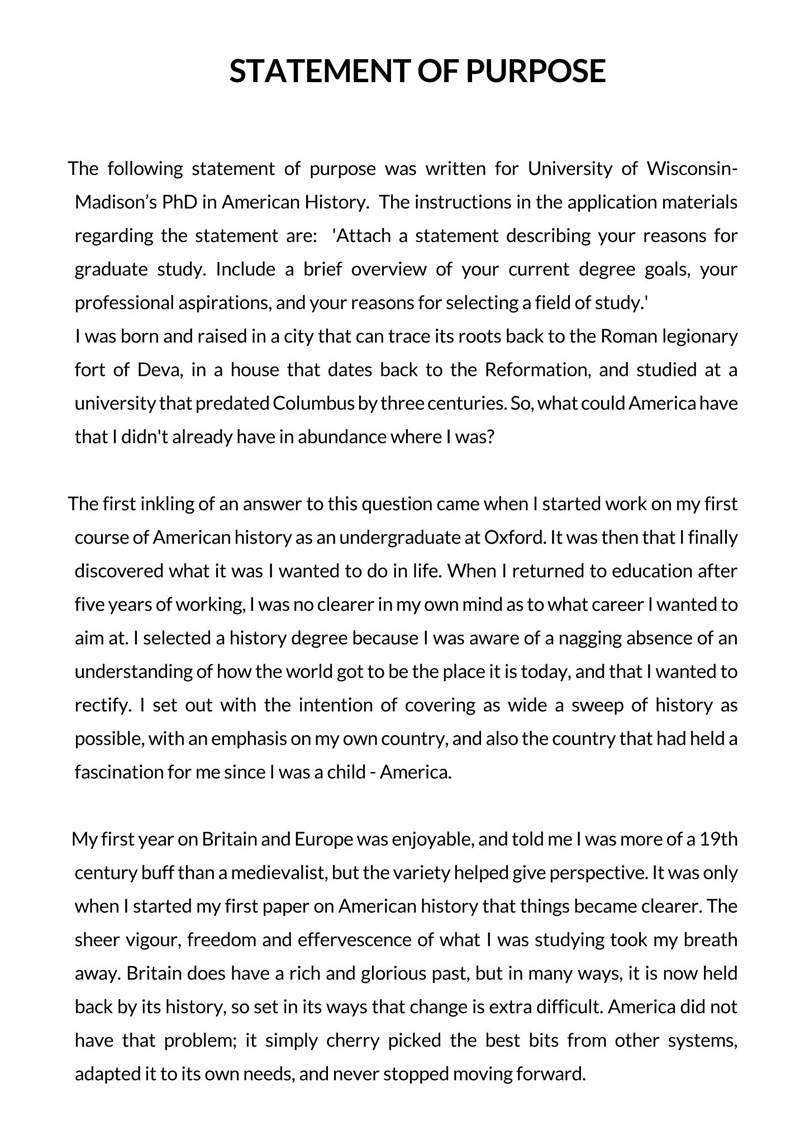
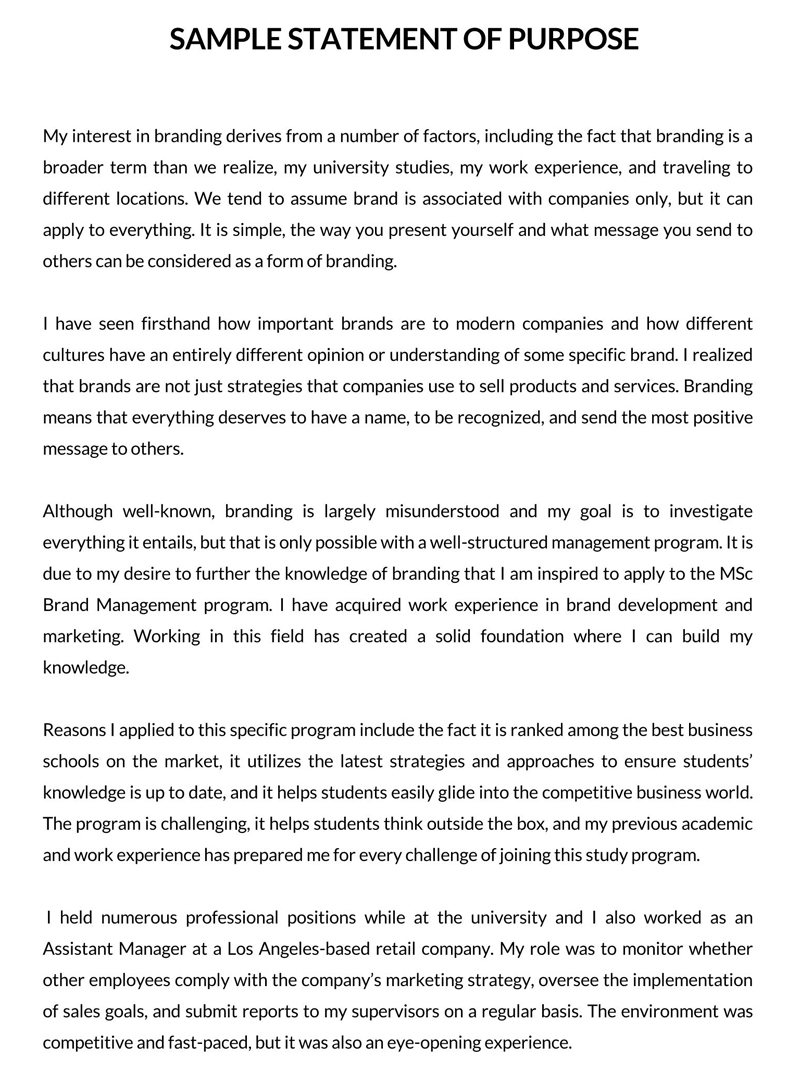
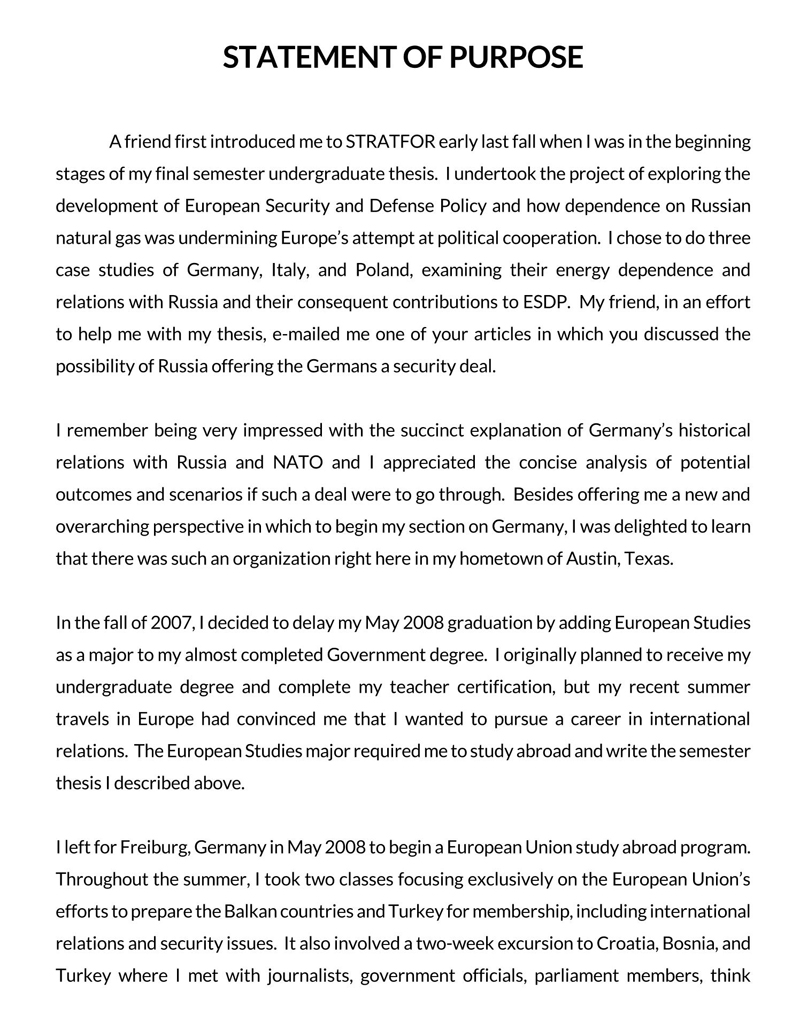
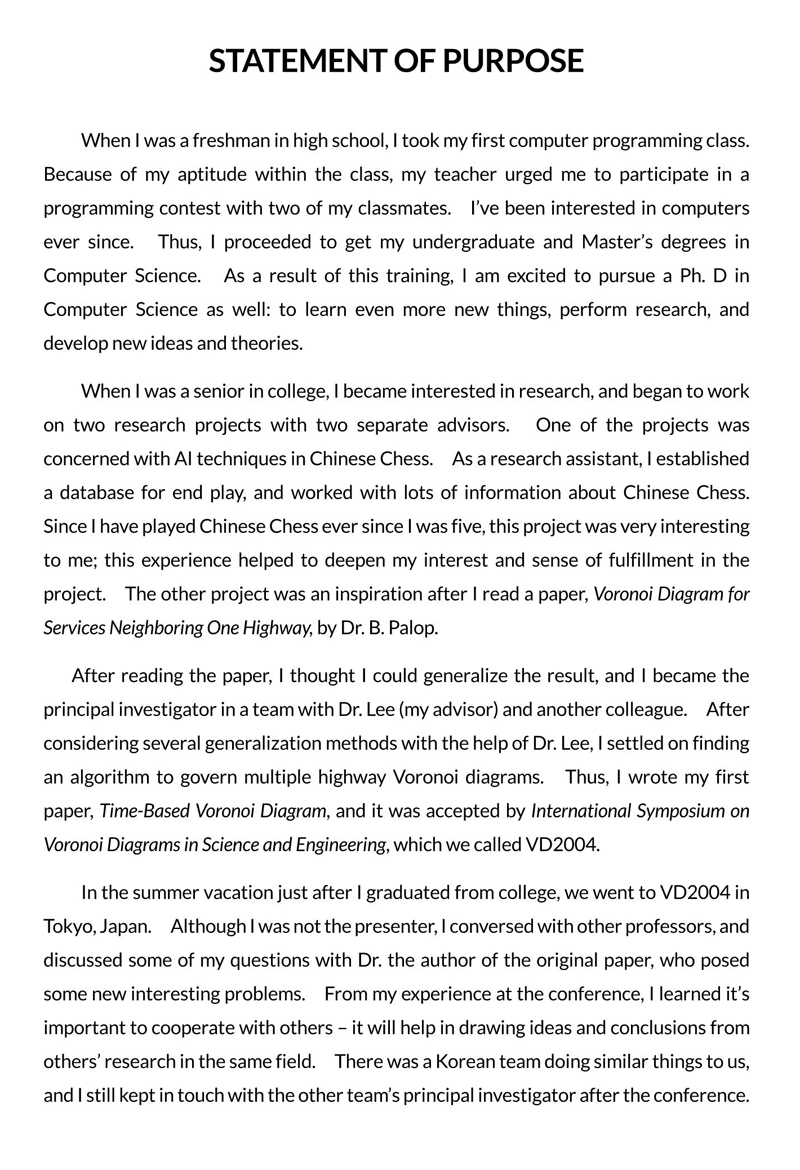
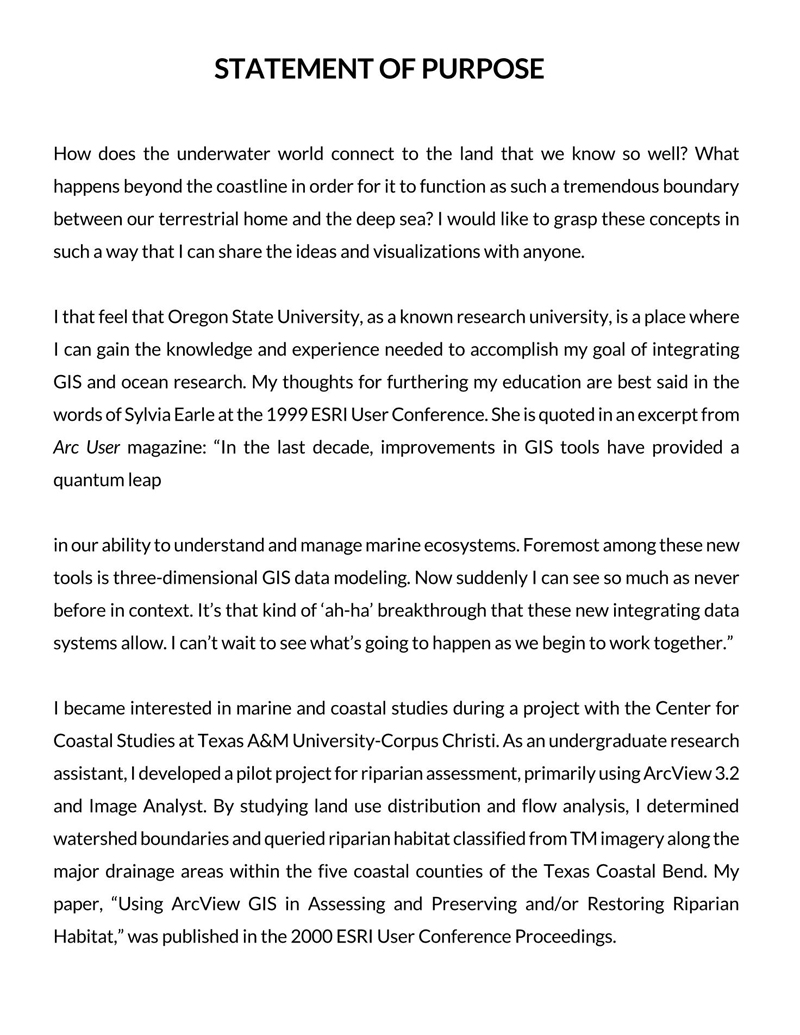
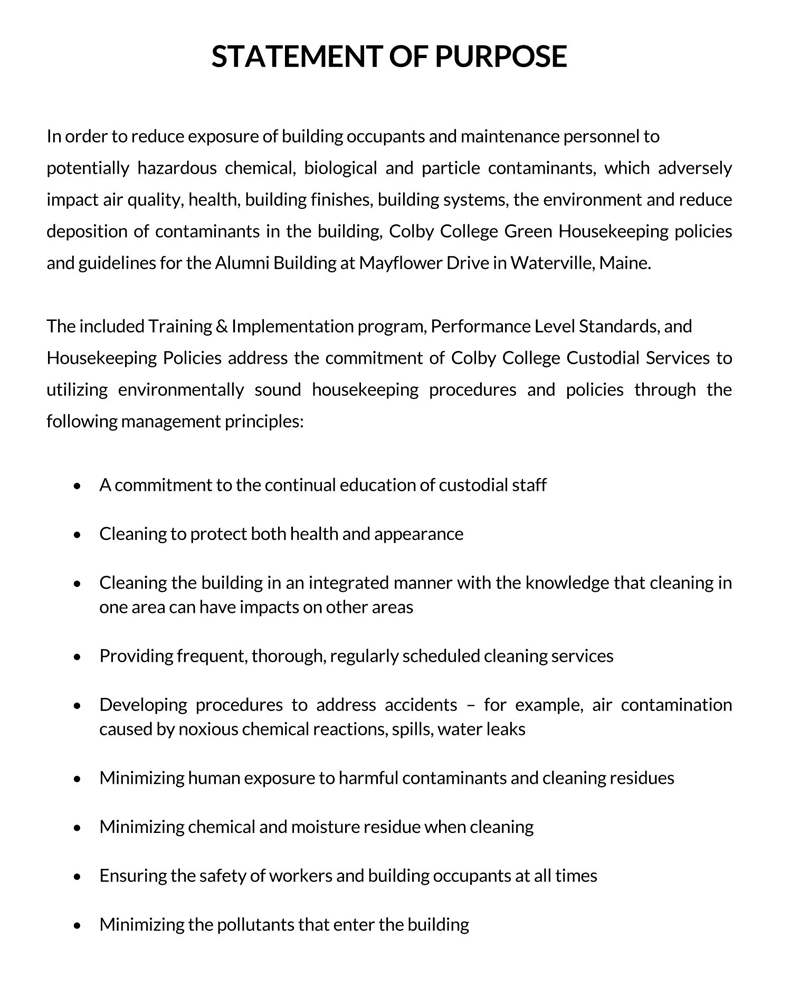
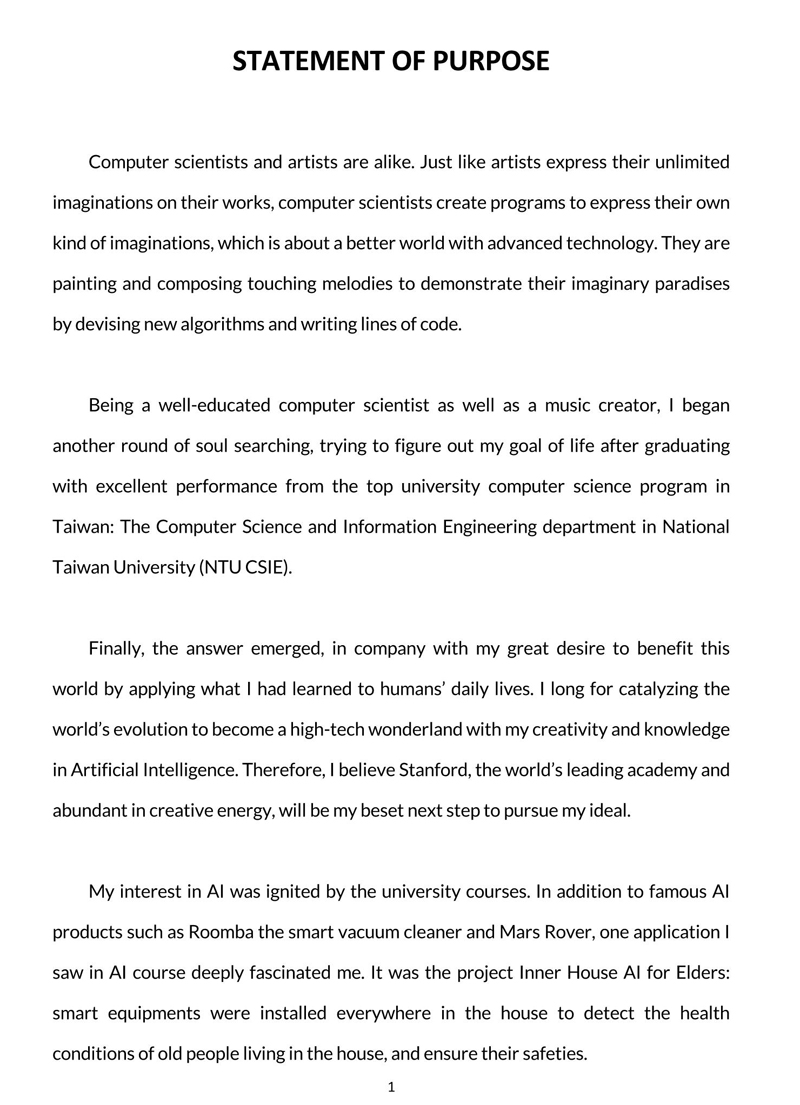
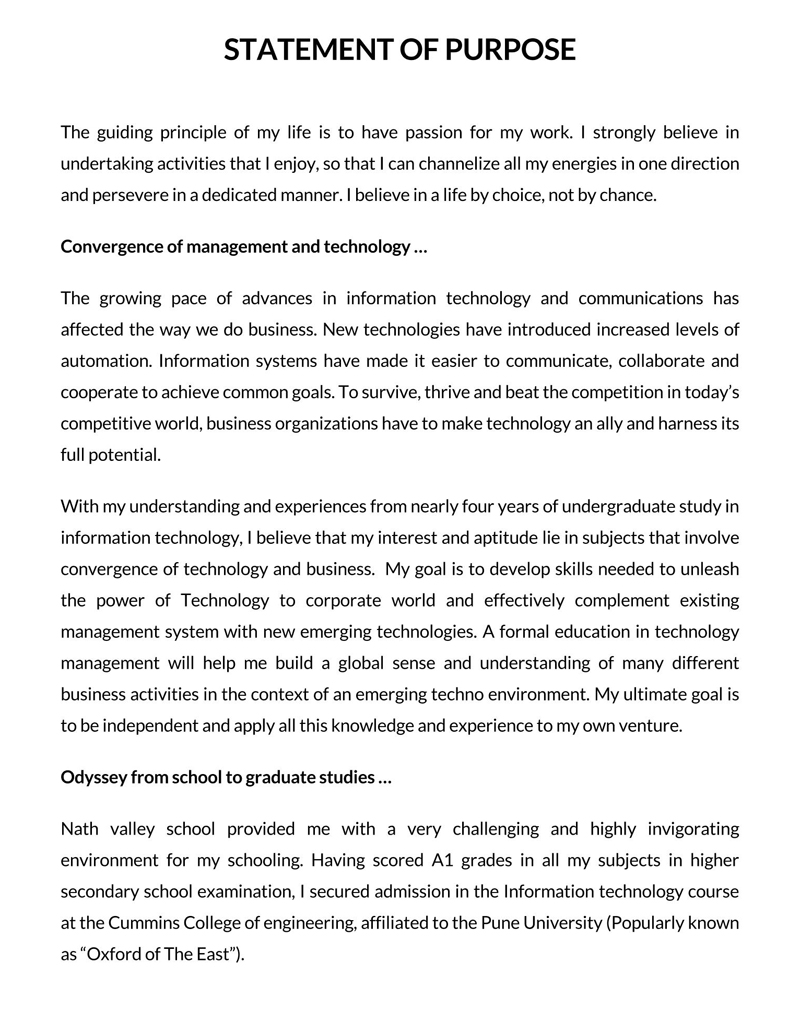
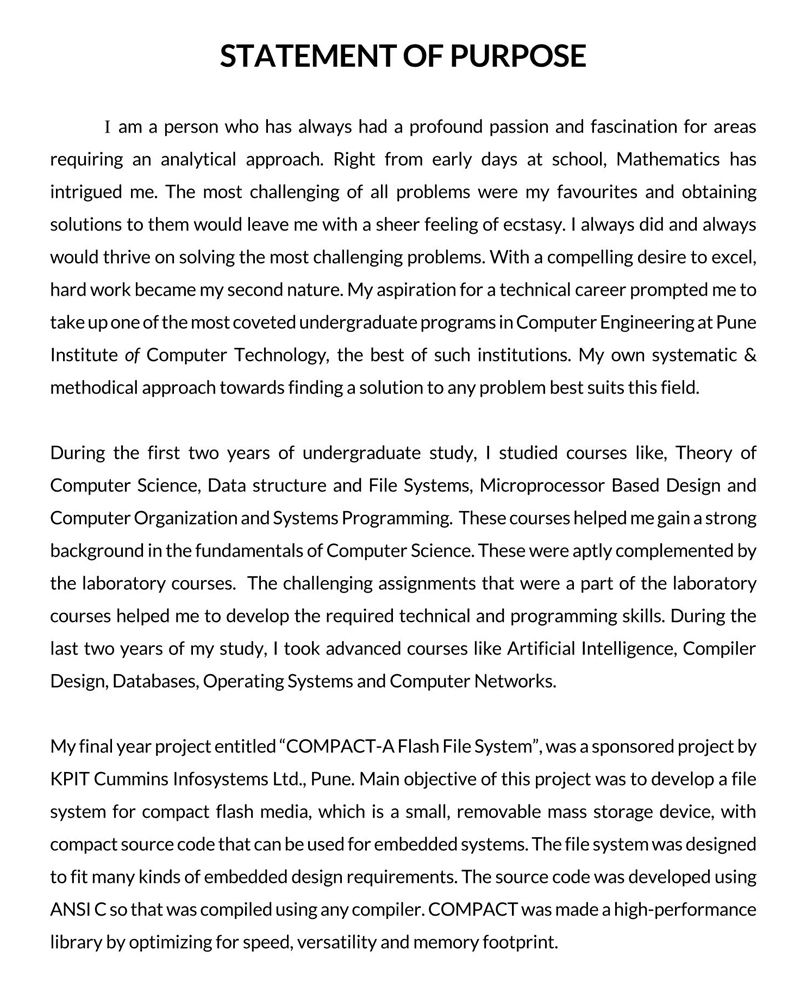
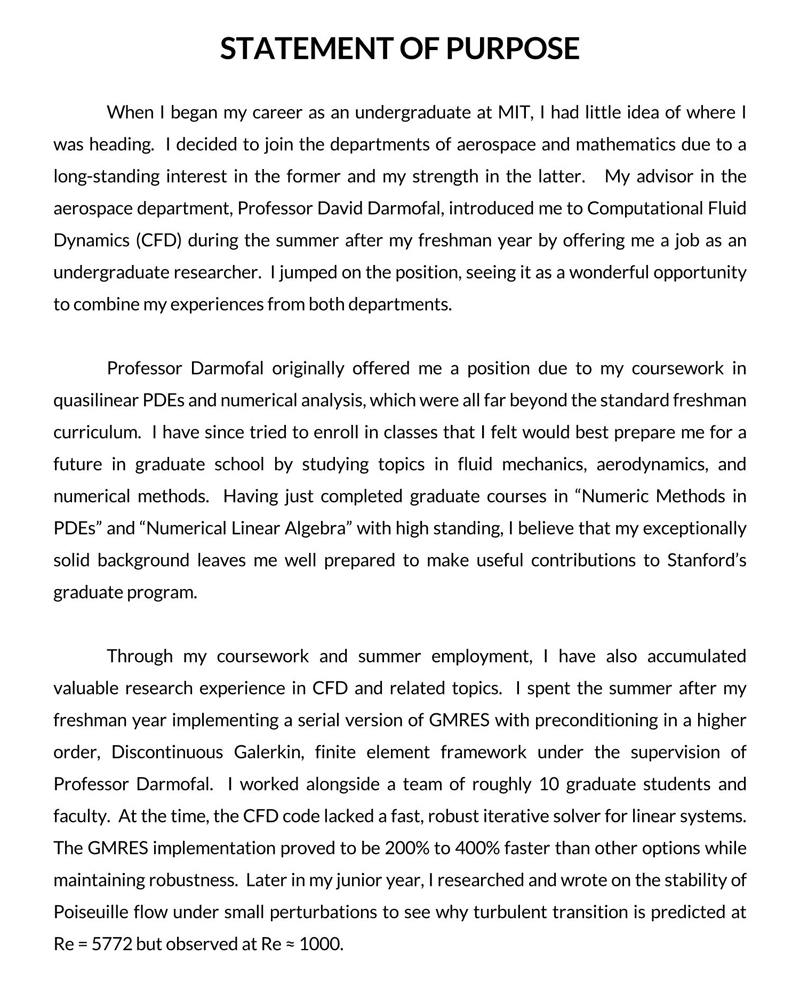
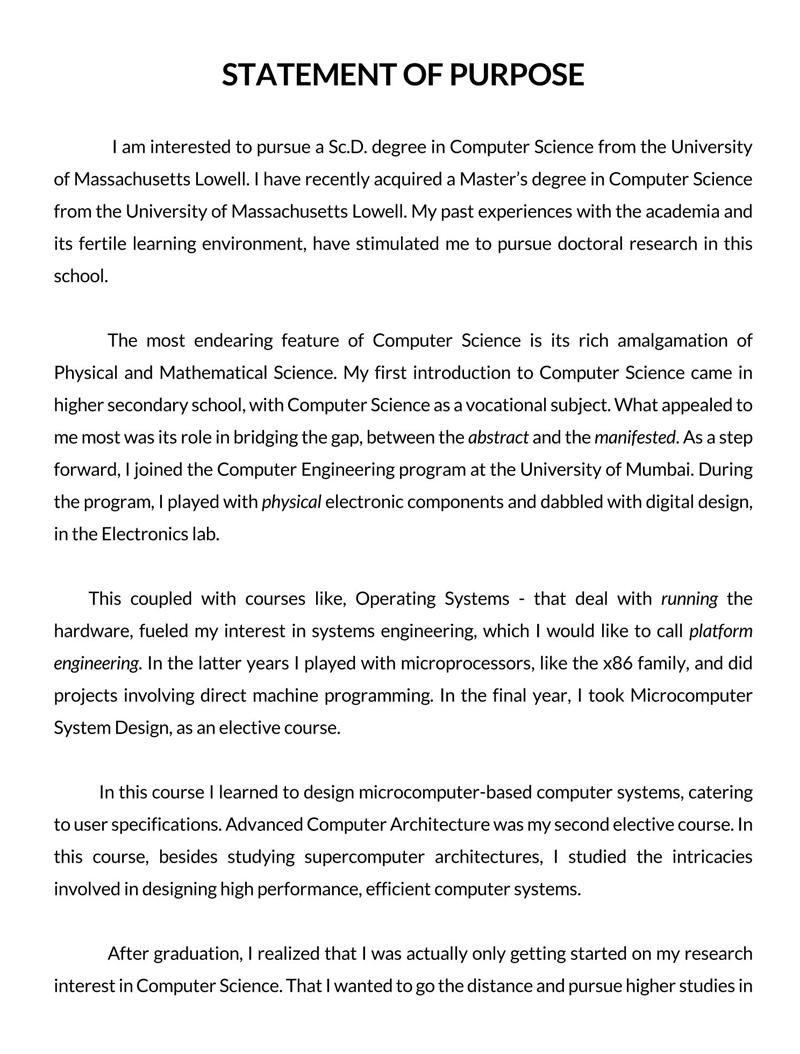
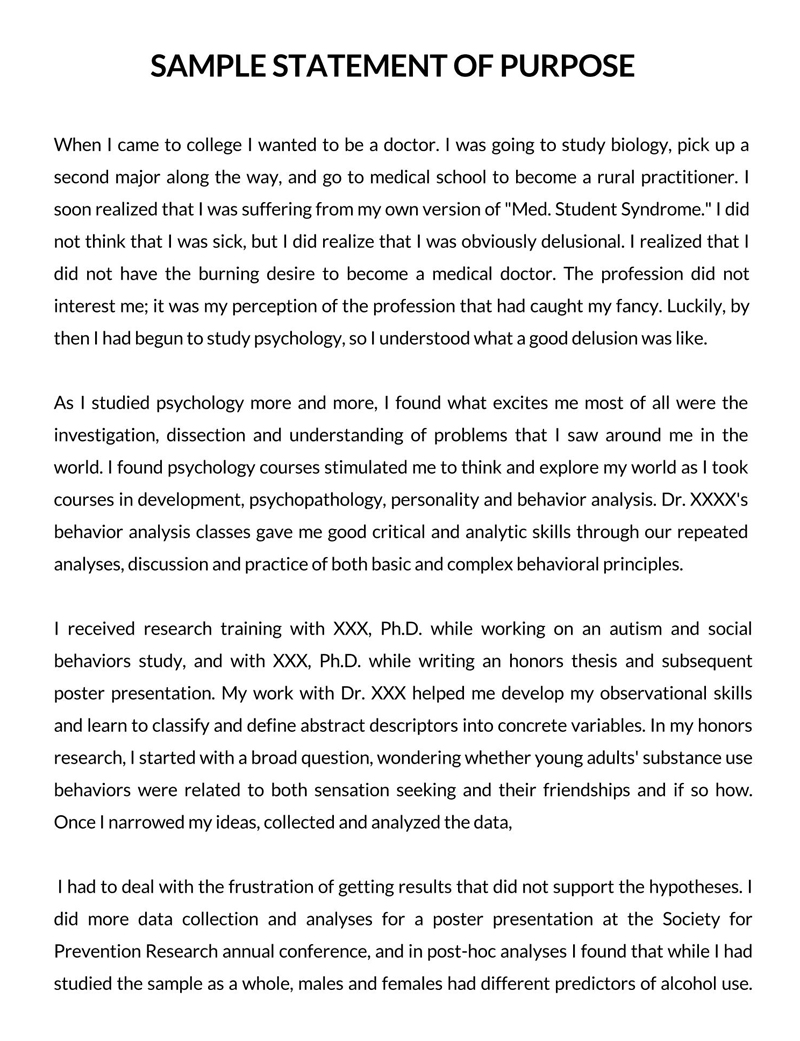
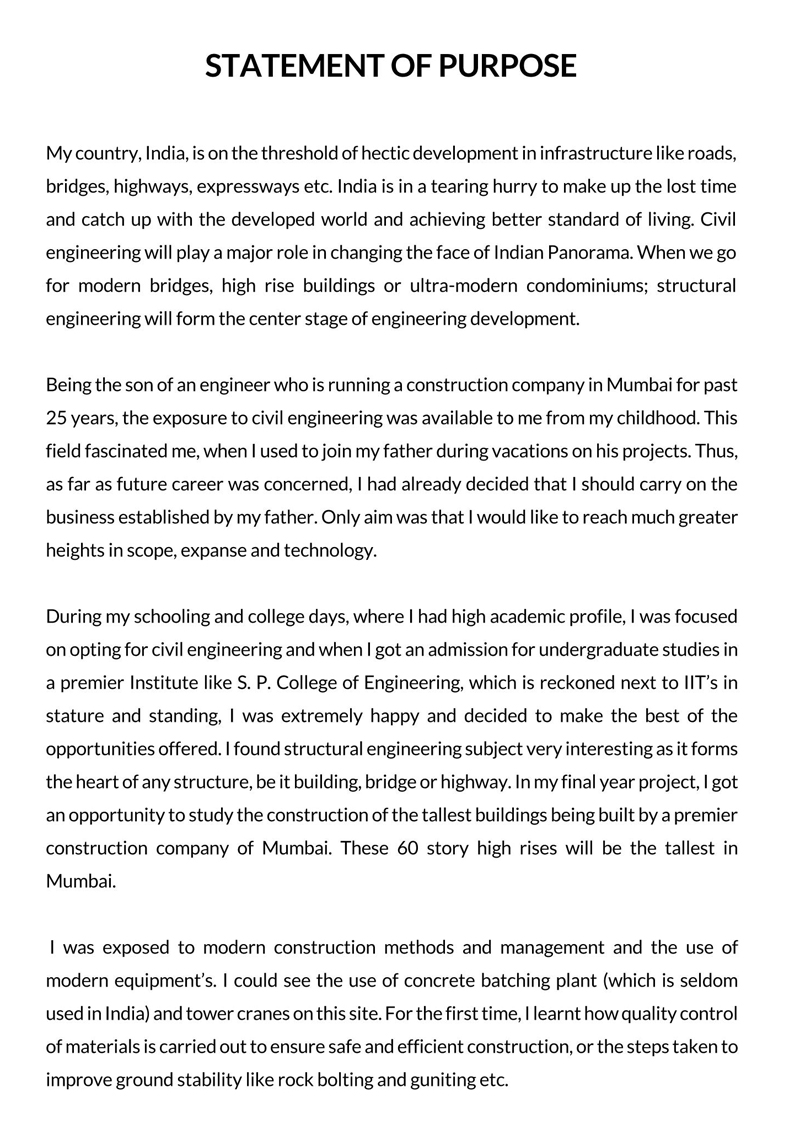
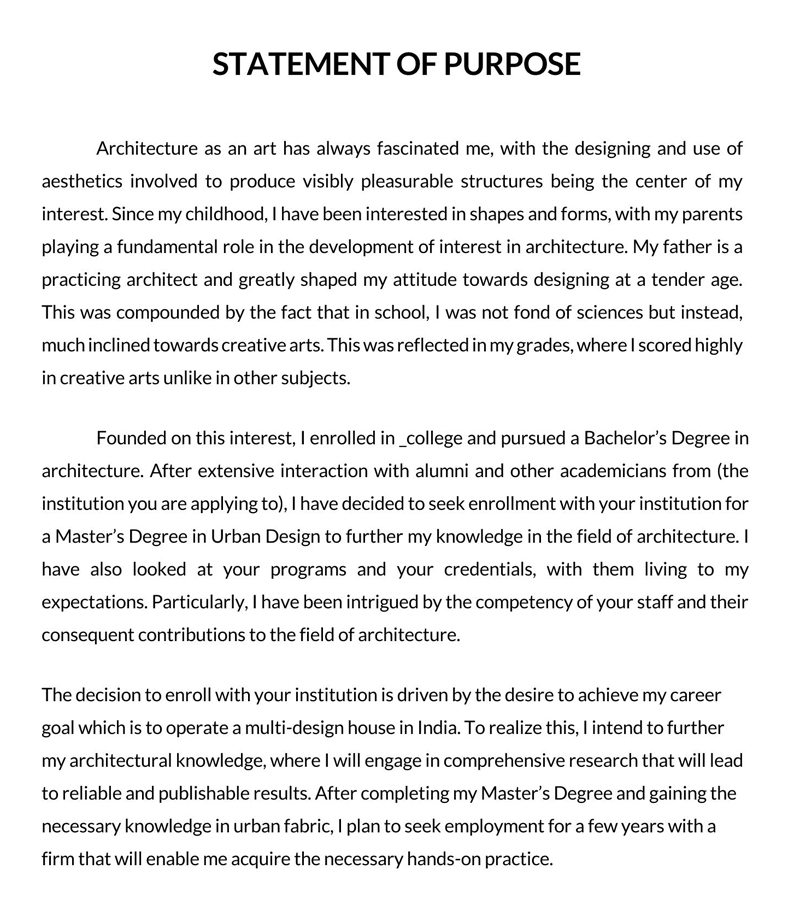
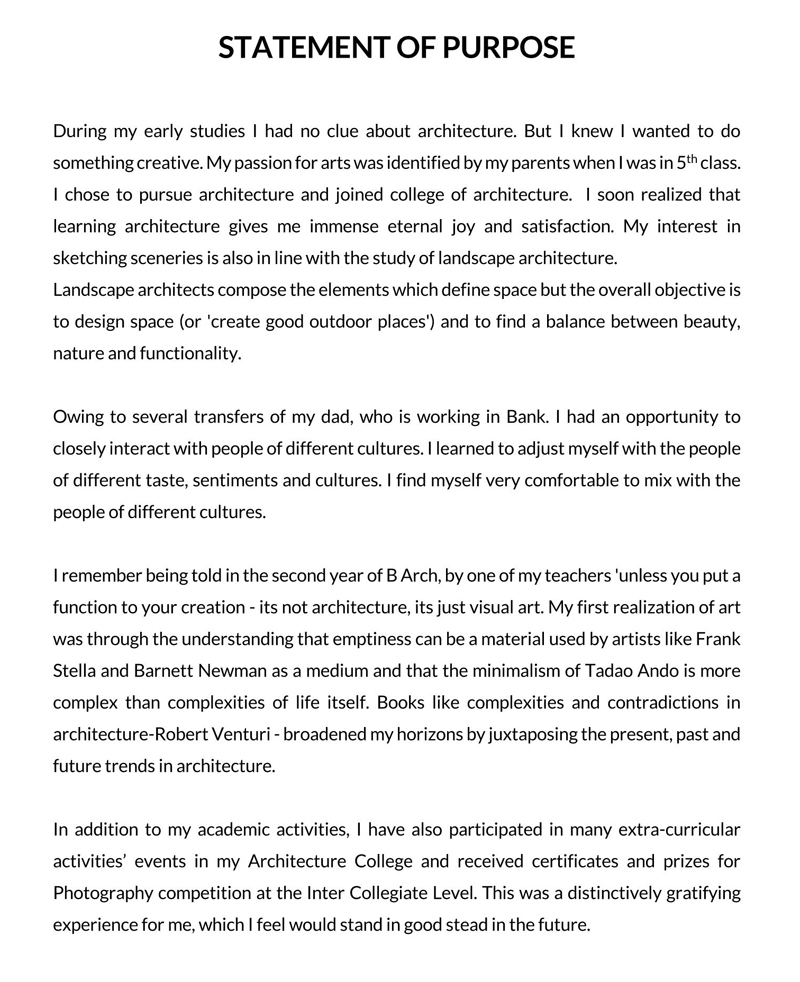
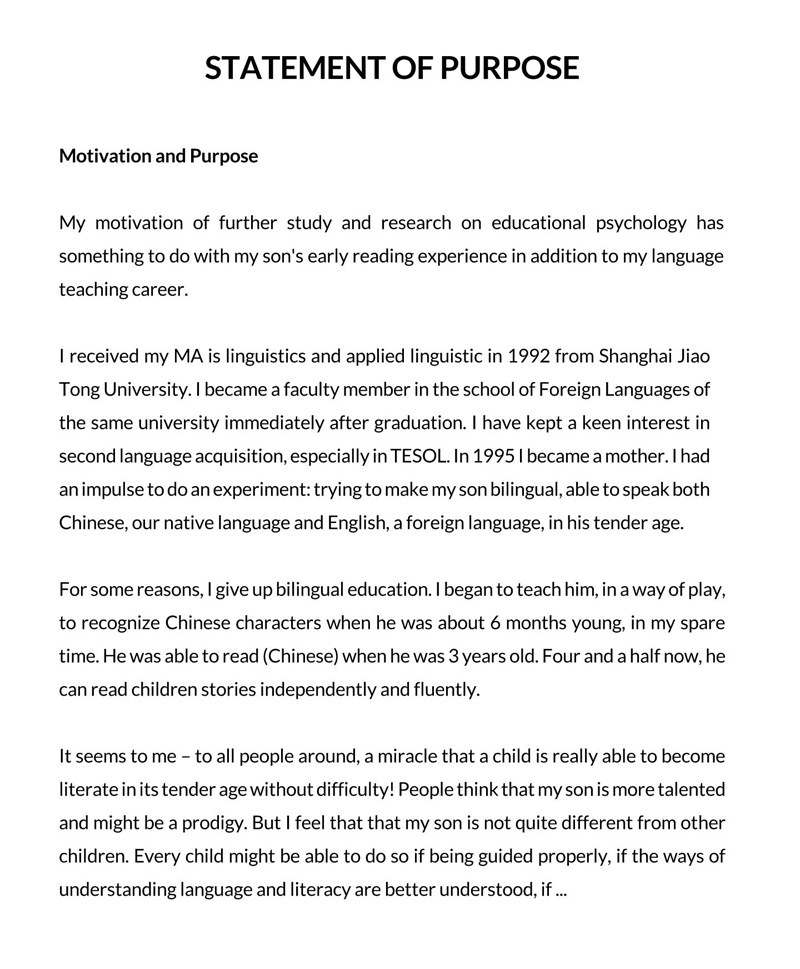
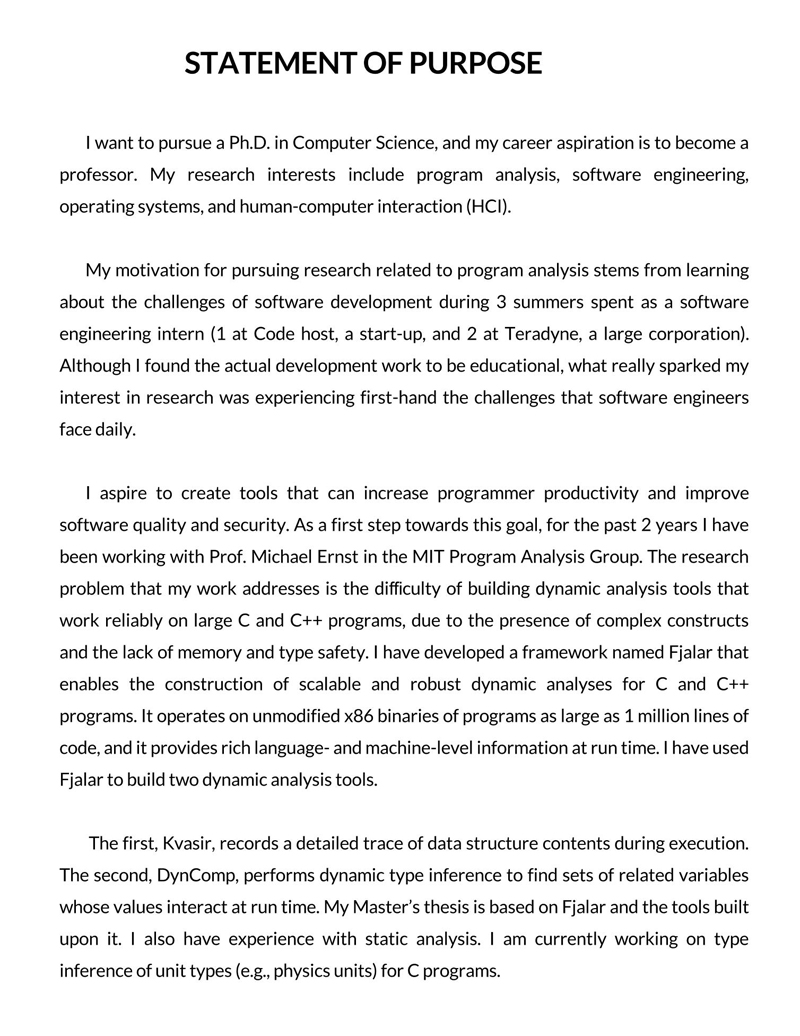
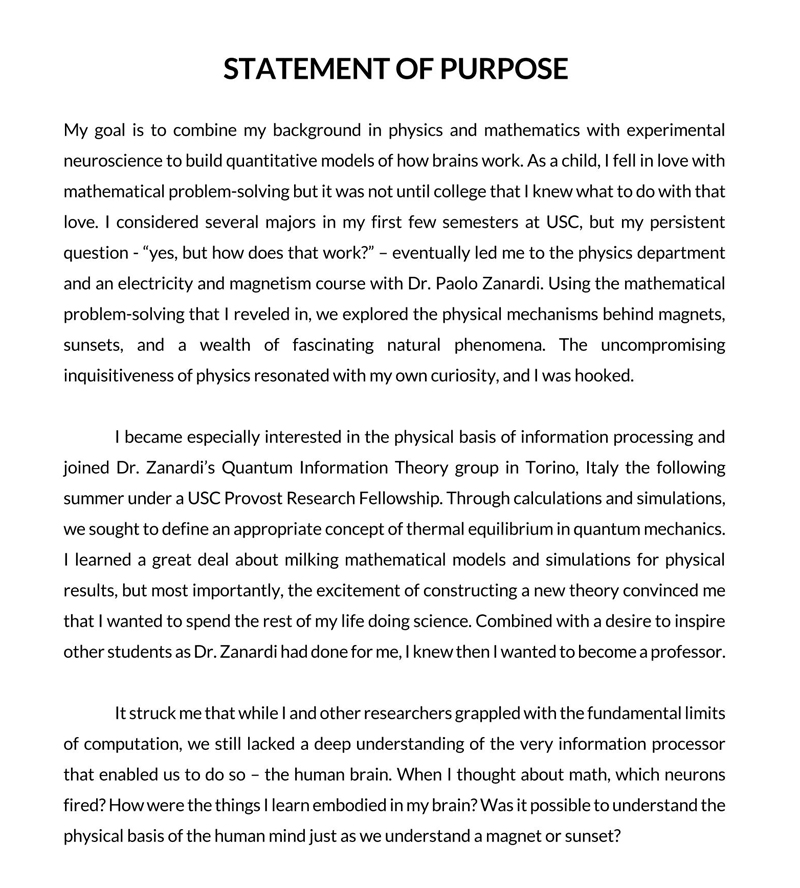
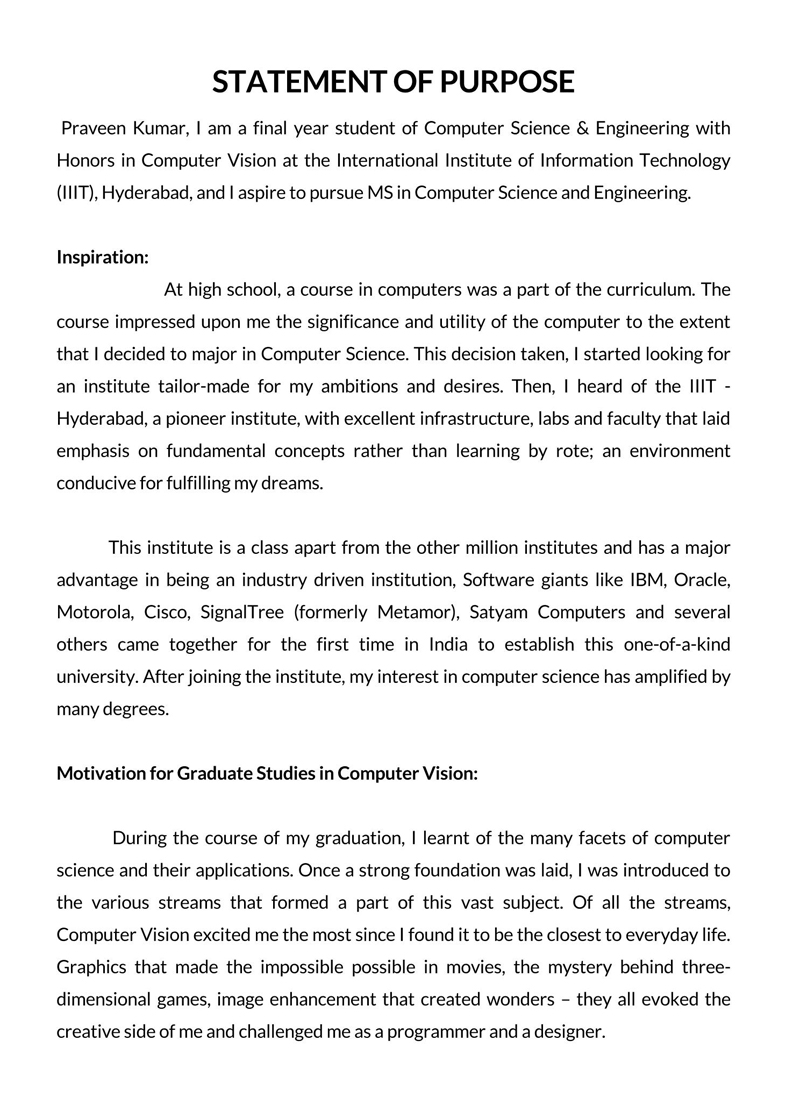
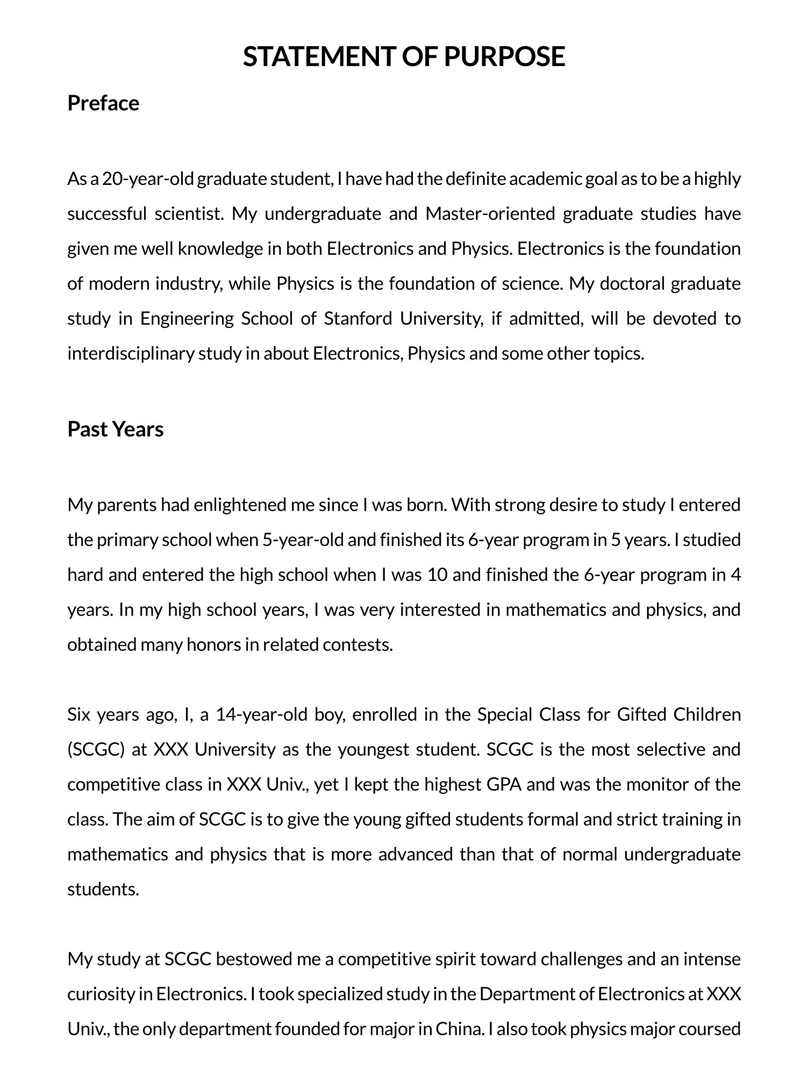
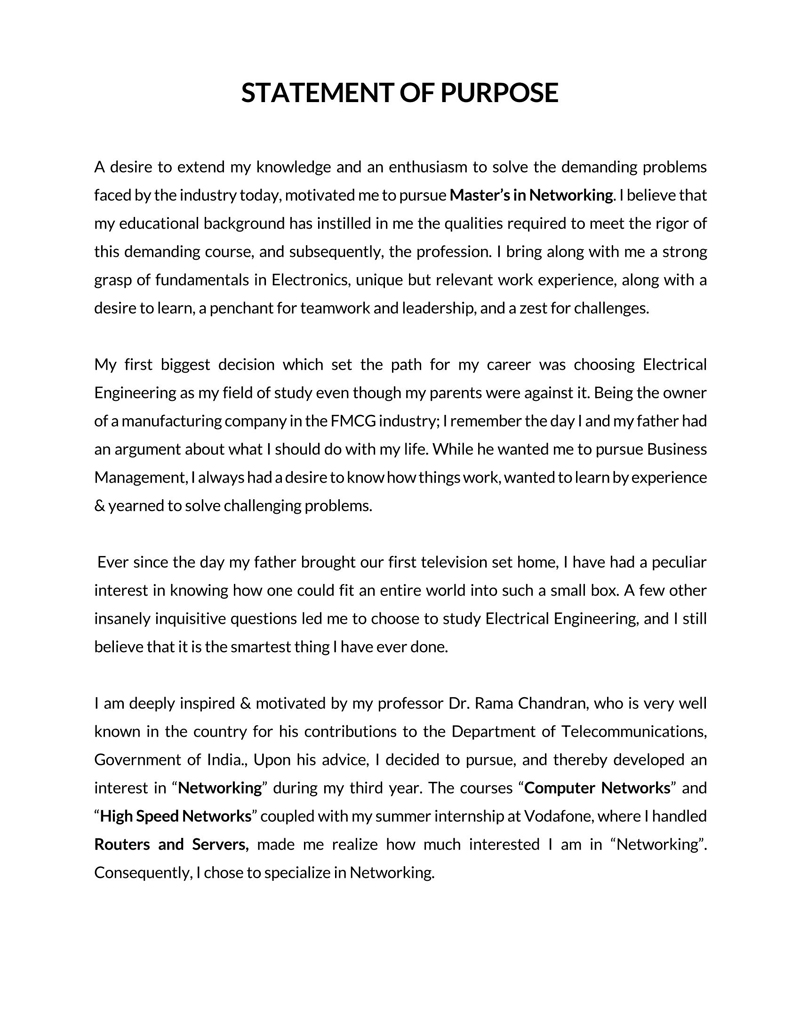
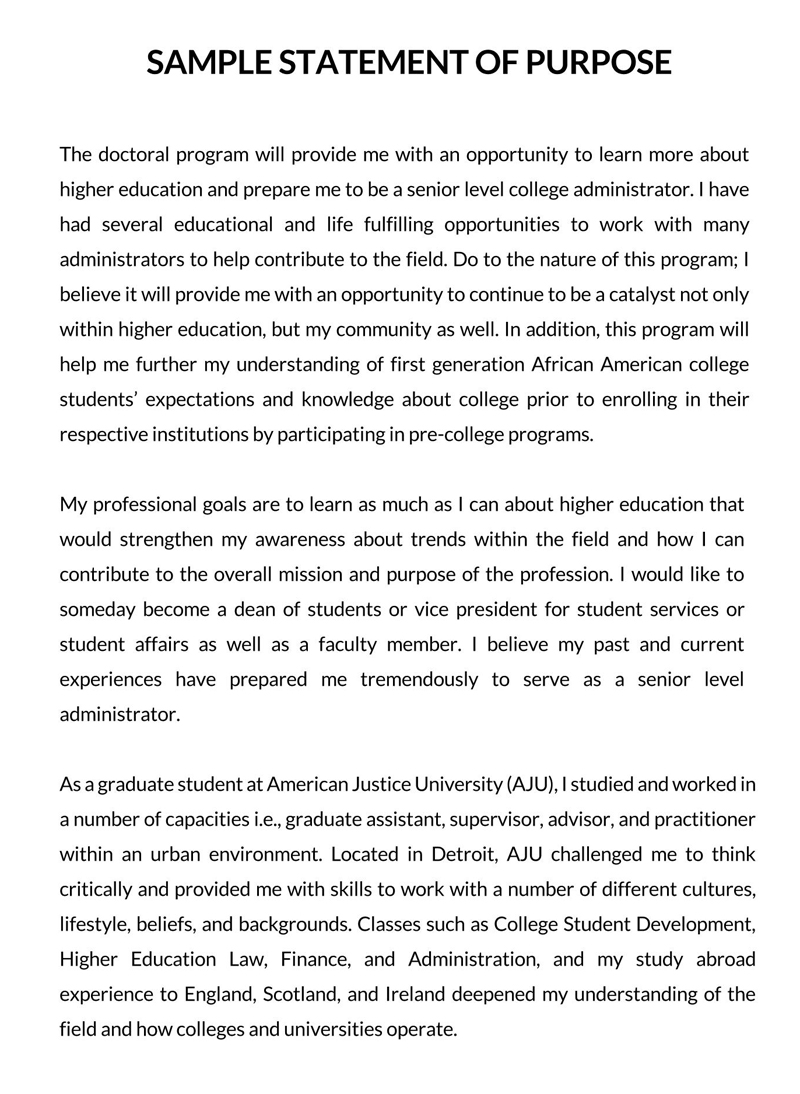
Purpose of SOP: What should It Reveal about You?
Admission committees will always be looking for applicants who are most suited and prepared for the graduate program. Therefore, they will often look for the following aspects in it:
Motivation and capabilities
The SOP should demonstrate why you want to pursue the program in that institution and how you have prepared yourself for intellectual and professional development. For example, the motivation behind the application can be presented in the form of career goals, interests, or any other compelling attributes of the program or institution, such as state-of-art facilities, etc.
For example, they can be assessed on their experiences and accomplishments, flow, and writing techniques such as tone, proper grammar, and punctuation.
Connection to the chosen field of study
It should draw a connection between the applicant and the program. This connection can be established by providing study-related interests and experience in the field of study that has led you to apply for the program. It should also show the applicant’s comprehension of the field of study and how being accepted can be positive addition in the same field.
NOTE
The admission panel will often look for an applicant’s experiences in the field, self-motivation, and passion for the field of study to sort out numerous applicants.
Statement of Purpose Vs. Personal Statement
When applying for a graduate program, you can be requested to submit a statement of purpose, a personal statement, or both. Even though these two documents are meant to add quality to your application, they do so in a distinct manner. For example, a SOP will revolve around the applicant’s qualifications and preparedness for the field of study, and as such, it appeals to the panel’s rationality.
On the other hand, a personal statement will concentrate on the applicant’s individuality or personality and experiences and accomplishments. As a result, they appeal to the personalities of the panel.
How to transform a statement of purpose into a personal statement?
Due to the crossovers of information in a SOP and a personal statement, the former can be transformed into the latter. SOPs are relatively more formal than personal statements. Therefore, you can transform it to engage the reader more and to convert it to a personal statement.
Since an SOP’s introduction will generally be brief and precise, it can be transformed to match your personality as to sound more “personal.” Use the in-media res – “in the middle of things” technique – a writing technique where the author opts to start a document right in the middle of things or in between events as a story.
EXAMPLE
Start the introduction straight in the middle of a story or event based on experience or family story that can be tied to the field of study later in the document. The story initiates a theme that will be consistent throughout the document.
After the introduction, edit it while inserting commentaries that tie its content to the established theme, and consequently, the SOP is then transformed into a personal statement.
Then, make the document “personal” by making the story as unique as possible by being more descriptive. Also, find creative ways of engaging the reader. Remember, a personal statement is less formal, and therefore writing techniques for the reader engagement will have vast significance.
Considerations Before Writing
Due to the significance of it, you need to get it right before submitting it. Therefore, adequate planning comes into play if one writes it that compels the panel to choose them. Therefore, the following pre-writing essentials should be considered before writing can begin.
Set aside the time
An SOP is a multi-faceted document that will typically take a lot of time to prepare. It is not a thank you note that can be drafted last minute, enough time should be assigned to each task that results in the final SOP: research, drafting, rewriting, editing, etc. The earlier you start, the better.
Research school and your program thoroughly
It is a formal document, and therefore its preparations should be treated as such. Extensive research on the institution and the program should be done to add substance to the document. Visit the school and observe their culture, mission statements, and core values and align the purpose statement with them. Research the program by visiting site pages dedicated to the program and pick out as much as necessary information to incorporate in the document.
Brainstorm the reasons
Do some critical thinking and identify ways in which your selection for the program would be mutually beneficial. Try to incorporate how and why you would be a good fit for the institution, faculty, and department. These reflections will help you out while writing it for example or for proper use.
Contact any mentors
Search for mentors within the respective faculty and introduce yourself. A mentor can be any faculty member whose work is of interest to you or aligns with your field of study. Mentors can increase your chances of being accepted in the following ways; either by listing them as your potential mentors, which increases your credibility to the admissions panel, or having them vouch for you.
List any requirements/suggestions
Schools will generally have guidelines or specifications such as formatting guidelines, length of SOP, etc., that candidates must meet to be selected for different graduate programs. Carefully review these expectations and note down the essential requirements if the school has issued a prompt.
Get all the needed materials
Before writing it, always confirm with a checklist that all the needed materials are within reach. Some of the materials are CV, academic transcripts, program brochures, certifications, etc.
Make some notes
While reviewing available materials, shortlist experiences and achievements that you would like to prioritize in your SOP. Next, brainstorm and outline your strengths and weaknesses. This gives you a starting point that simplifies the writing process.
How to Write a Statement of Purpose?
Once all preparations have been made, writing can commence. Writing can be a lengthy process that can be broken down into manageable steps based on the three components of a standard SOP example.
These steps have been discussed below:
Introduction
First and foremost, the document should have an introduction. The introduction introduces the applicant to the reader and outlines the motivation and interests behind the application.
The reason for the application should link all the experiences and achievements to be discussed in the SOP. When writing the introduction, consider including the following details:
Your focused interest in the program
Communicate to the panel why you are interested in the program. This should be as specific as possible. An assertive applicant will often move recruiters. Examples of interests that can be included are research gaps you would like to explore, problems of interest in the respective field that you find intriguing, and perspectives and intellectual influences on a particular subject in the field of interest.
Clear articulation of goals and interests
Clarity is a significant aspect of the introduction to an SOP. Briefly mention personal and professional goals that will be influenced by the reviewer’s decision to choose you. These goals and the mentioned interests should be specific without any ambiguity.
The reviewer should not have to spend minutes trying to understand what you meant. Clarity should not be mistaken for lack of suspicion, write the introduction such that the reviewer remains engaged and wants to know more.
Body of SOP
Next, proceed to write the body of the SOP. This is where you are expected to persuade the reviewer that you are a worthy candidate. And back this up with concrete information. Details that ought to be written in the body are as follows:
Experiences and accomplishments
You should state any relevant experiences and accomplishments you have had in the past. Examples of experiences you can list down are jobs, internships, research assistantships, and voluntary works. Accomplishments added in it can be personal or career-wise – for example, presentations, fundraising, panelist, dissertations, etc.
TIP
Use the examples to illustrate why you want to undertake the graduate program and how the experiences and accomplishments shaped your interest in the field. This is done by describing the experience, duration, reason, lessons, and accomplishments obtained from experience.
Academic/professional preparation
Admission committees will also want to see how prepared each candidate is to take up the grad program academically and professionally. Academic and professional experiences will usually equip you with the tools/skills necessary to succeed in a particular field. Also, outline any research projects (personal or joint) and teaching assistantships you have been involved in.
Providing examples of implementing what you have studied goes a long way to show your qualities as a practitioner in the particular field. This boosts your chances of being accepted by the admissions panel. Finally, outline any skills obtained from these experiences to represent a candidate’s preparation to deal with real-life scenarios.
To illustrate academic preparation, discuss relevant degrees, courses, and certifications you have completed or are undertaking. Outline only the academic qualifications that relate to your interests in the field and the specific program. Outlining any related conferences, you have attended is also a great addition to the statement of purpose.
Your strengths/weaknesses
As much as it is meant to focus on your strengths, highlighting both strengths and weakness creates a realistic insight into who you are. Discussing both strengths and weaknesses is a good indication that applicants are self-aware of their capabilities and shortcomings.
To connect your strengths and weaknesses to the purpose of the statement, consider the following:
- Relate the strengths and weaknesses to the academic and professional responsibilities. However, the strengths should take precedence over weaknesses. Strengths are an indication of capability and potential, which are all desirable traits.
- Be self-aware and objective. As much as possible, be honest, and where you have shortcomings, do not try to be defensive but rather declare your commitment to improve. The will to self-improve is a big selling point in applications.
- Use real-life examples where the strengths and weaknesses were manifested. Strengths can be indicated by events where you overcame odds or did exemplary work despite having setbacks. Note down any lessons learned from that. The ability to overcome challenges is a big seller to reviewers.
Apply a narrative
The details provided should be stringed together in a coherent manner taking the reader seamlessly through events/experiences to persuade them to select you for the opportunity. Use transitions and connectors to present the interests, experiences, accomplishments, strengths, and weaknesses to lead to the purpose of the SOP.
Ending/conclusion
Lastly, it should have an exhaustive conclusion that sums up everything discussed in the entire document. Ordinarily, the conclusion should be given in two paragraphs. Ensure that the conclusion appears in the following order:
Academic interests
Begin with reiterating your academic interests if you are selected for the slot like multi-cultural history, colonial history, etc., and how you intend to explore these interests within the school, and any works by specific professors.
Next, you can list projects you would like to be involved in within the schools; this will need research about the department or program-associated professor’s works. This paragraph should let the reviewer know your academic interests.
Future /career plans with master or Ph.D.’s degree
Finally, in the last paragraph, talk about your plans, academically and professionally. Indicating plans represent your long-term commitment to the field, and thus if, given the opportunity, you will make the most of it. Some people want to explore their studies further, while some want to pursue graduate programs to be equipped for roles in the industry.
You can do this by outlining skills obtained from the specific program and how you intend to utilize them in academia or professionally. However, if you have a specific job in mind you would like to pursue, you can discuss your dream job and what attracts you to it in this section.
Example for the Statement of Purpose
I am fascinated by the incorporation of IoT (Internet of things) in intelligent homes. Therefore, I’m applying for a graduate program in Automation engineering at the University of Pennsylvania to prepare myself for a career in automation engineering – a specialty I would like to entrepreneur in.
My interest in the automation of things has grown over the years due to my first-hand experience with its convenience to users. Additionally, with the fast pace of innovation in technology, I intend to be an active participant in the industry. There is a colossal potential for diverse ways to automate household chores like cleaning, cooking, lawn mowing, etc.
I have a bachelor’s degree in programming and data science from the University of New York. Through the course, I have familiarized myself with the principles of AI, data analytics, and in-depth programming. Having a background in IT, I can quickly grasp IT-related concepts, which are a foundation of automation. Furthermore, I am familiar with fundamental guidelines in IT and will therefore fit in seamlessly within the IT fraternity at the University of Pennsylvania.
I have developed digital marketing websites and applications for different companies within the last two years. Users have reported an increase in efficiency from an average of 55% to 80% efficiency in service delivery since introducing the websites and applications in the respective businesses. I aim to replicate this and have more success in the automation of intelligent homes.
Automation engineering is an area I am well committed to belonging in, and this opportunity will be a step closer to my goal. I plan to start up a company after completing my studies, and that being in the next three years, if I get the opportunity, will be a suitable time to venture into automation. I have a solid belief in volunteer work. If given the opportunity, I will be more than willing to be an active member of the Angels Without Wings Voluntary Program of UPA. The school will also be an excellent opportunity to network with future movers and shakers of different industries. I’m always eager to teach and learn from others with the same measure. I believe I’m a suitable candidate for this program and have a lot more to offer if given the opportunity.
Do’s and Don’ts
Every applicant’s goal is to develop an exemplary statement of purpose that sets them apart from other candidates. To do so, this article has highlighted several tips applicants can incorporate in the SOPs to make this work.
The tips that are recommended for improving the document are:
- Adopt a chronological structure: When outlining events, use a chronological order starting the oldest events up to the most recent. A chronological outline helps in creating a flow of events and creating a connection between ideas.
- Don’t rely on clichés: Don’t use popular clichés such as “I’m a hardworking person” or “I enjoy reading.” Instead, add substance to the SOP by citing examples where your hardworking and reading skills were used.
- Use an active voice and a more personal language or tone: The statement should reflect you as a person, not simply a list of your experiences and accomplishments. Use an active and personal tone that engages the reader and provides an in-depth insight into the type of person writing the statement.
- Don’t use fancy language or technical jargon: Always remember that an SOP is a formal document that should be written professionally. Therefore, avoid using fancy words or phrases and too discipline-specific terminology that may not be familiar to everyone in the admission panel. If a specialty-specific term has to be used, it should also be defined.
- Be detailed and specific by using examples: Provide as much information as possible. A statement of purpose is not a CV, and as a result, it should not be written as such. Instead, include names, methods, and specifics as to what you are talking about, as the use of examples is an effective way of doing this.
- Unnecessary personal details: As much as anyone would want to make the statement as unique as possible, avoid including unnecessary information or overwhelming hardship stories that influenced your interest in a particular field. Remember to keep it professional.
- Be positive throughout the SOP: Show positivity throughout the statement. Even in cases where there are elements of negativity, such as a sad event, do not project this in your writing. Instead, keep the mood of the statement optimistic and resilient.
- Hobbies and inapplicable extracurricular activities: Do not include your hobbies in a SOP at all costs. It will normally be tied to academic and professional qualifications; hobbies are more suited for a personal statement. Some applications will require you to include your hobbies, if that is the case, then follow the guidelines, but if there is no such requirement, hobbies should be avoided.
- Create a flow of ideas: Each idea, topic, or event should be incorporated continuously, working towards a common objective. The statement should not appear as a group of separate ideas with no relationship. Instead, each topic or event should be included to improve other topics or events and the entire statement.
- Don’t plagiarize: Each SOP you submit for review to a panel should be an original. Don’t have someone else write it for you or copy it and submit it as yours. However, you can ask for guidance. Plagiarism is considered misrepresentation of your abilities and lowers the academic integrity of your SOP.
Other Useful Tips
Following are some last-minute tips:
Several drafts of your statement
When writing it, rarely will anyone get it right with the first trial. Therefore, always be ready to write and rewrite the SOP. Carefully review each draft, highlight areas of improvement before writing another draft. Then, incorporate these changes until a satisfactory draft is developed.
Proofread
Always proofread your work once you have the final draft. Look out for grammatical errors, typos, misspellings, and sentence structure. The existence of errors and mistakes can undo your hard work by devaluing your candidacy.
Ask for feedback
Ask people who can give you an honest opinion and how well your statement of purpose has been written to review it and give feedback. Do not avoid constructive criticism as it helps you improve how a third party perceives the statement. Asking a professional mentor is highly recommended as they are more familiar with what is expected of you.
Use graduate-level academic writing
Since people in academia will most certainly review the statement, use graduate-level writing to show your level of education. Keep it formal and professional too. Use a formal tone like you are addressing academics and incorporate jargon commonly used in the particular field of study. A formal tone helps in illustrating that you recognize the authority while the professional SOP is a strong indicator of how the applicant conducts themselves.
Frequently Asked Questions
It is meant to acquaint the admission committee with an applicant by highlighting their interests, experiences, and accomplishments as a compelling narrative that encourages the committee to accept them for a graduate program.
Ordinarily, it will be 500 to 1000 words long. This range will, however, differ depending on the situation. For example, some SOP applications requires a predetermined number of words that are without any range.
If there is an obstacle or challenge you wish to include in the statement, mention it concisely and make it relatable to the context. Do not go into details. Some applications will provide applicants with an opportunity to discuss challenges that negatively impact their grades or work. If this is the case, provide this information in that section, which is usually separate from the statement. Avoid providing unjustified explanations as to why you achieved lower-than-expected grades or performance. They affect the reviewers’ impression of accountability.
The impact of your statement will highly be influenced by the writing process you adopt. Adequate planning is a must if you want an outstanding SOP. Give yourself enough time to write and rewrite several drafts and edit it. Also, be selective on the experiences and accomplishments you share in the statement. The proper selections will give you enough quality content to illustrate your suitability for the program.
A well-written statement will answer the following questions:
Who are you? – as a person and as a student
What have you achieved or done in your current or previous field of study?
How did your interest in the particular field of study come about?
Why/how do you want to take the graduate program? And why that specific school/university?
How/why are you the best candidate?
It should be structured to illustrate a clear path of your growth and development as a student or professional and as a person. All the events should be written in chronological order. A well-structured SOP will have the following format: hook, transition, academic background, extracurricular activities, personal and professional accomplishments, reason(s) for selecting the specific school, and a brief conclusion.




